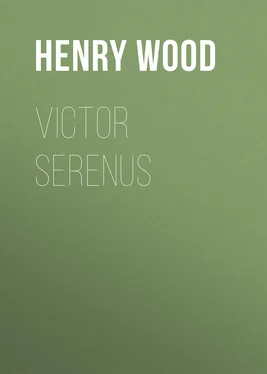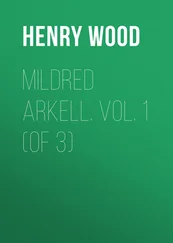Henry Wood - Victor Serenus
Здесь есть возможность читать онлайн «Henry Wood - Victor Serenus» — ознакомительный отрывок электронной книги совершенно бесплатно, а после прочтения отрывка купить полную версию. В некоторых случаях можно слушать аудио, скачать через торрент в формате fb2 и присутствует краткое содержание. Жанр: foreign_prose, literature_19, foreign_antique, на английском языке. Описание произведения, (предисловие) а так же отзывы посетителей доступны на портале библиотеки ЛибКат.
- Название:Victor Serenus
- Автор:
- Жанр:
- Год:неизвестен
- ISBN:нет данных
- Рейтинг книги:3 / 5. Голосов: 1
-
Избранное:Добавить в избранное
- Отзывы:
-
Ваша оценка:
- 60
- 1
- 2
- 3
- 4
- 5
Victor Serenus: краткое содержание, описание и аннотация
Предлагаем к чтению аннотацию, описание, краткое содержание или предисловие (зависит от того, что написал сам автор книги «Victor Serenus»). Если вы не нашли необходимую информацию о книге — напишите в комментариях, мы постараемся отыскать её.
Victor Serenus — читать онлайн ознакомительный отрывок
Ниже представлен текст книги, разбитый по страницам. Система сохранения места последней прочитанной страницы, позволяет с удобством читать онлайн бесплатно книгу «Victor Serenus», без необходимости каждый раз заново искать на чём Вы остановились. Поставьте закладку, и сможете в любой момент перейти на страницу, на которой закончили чтение.
Интервал:
Закладка:
At the particular time with which we are dealing, general peace prevailed. There was one of those alternations of calmness which intervene between the fierce storms of racial conflict and religious strife and persecution.
The Jewish procession, small in numbers, but important in spirit and destiny, threaded its way through the winding thoroughfares, attracting but a passing glance from the cosmopolitans which made up the multiform currents of every-day life in Tarsus. At length it halted in front of a family residence in the better part of the Hebrew quarter, into which one of the priests with the father of the child entered, followed by the mother with her young son in her arms, while the others dispersed. The babe, Saulus Paulus, was forty days old, and, in conformity to the Jewish ritual, had been taken to the synagogue for the prescribed presentation service.
Before leaving the household, the priest tenderly took the child in his arms to give him a final blessing. Raising his eyes toward heaven, he seemed to feel a spirit of prophetic inspiration. With his right hand upon the head of the child, he reverently presumed to lift the curtain which veils the future, fervently exclaiming,—
“Son of Abraham, scion of the tribe of Benjamin, and heir of Benoni! The living blood of the Covenant flows in thy veins! Thou shalt wax strong, and be learned in all that pertaineth to the Law! Thou shalt be a tongue of the God of Jacob, and many shall tremble when thou speakest! Thou shalt be a defender of Israel, and bring judgment to the Gentiles! Thou shalt open thy mouth and utter mighty things that are hidden from the Greek and Roman! Thou shalt sorely vex the enemies of the Circumcision, and bring them to naught! With holy zeal shalt thou pursue them”—
Then his visage became fixed, and he was like one in a trance. A voice, not his own, seemed to use his lips. “I behold—judgment—defeat—darkness! The uncircumcised prevail! ”
Abdiel, the priest, trembled like an aspen, and upon coming to himself, declared that he had seen a disturbing vision.
The ancient Judaism accepted no compromise, and bowed to no defeat. When surrounded, and even almost submerged, by prevailing idolatry, polytheism, and heathenism, like a bow temporarily bent, it at length sprang back, and regained its original integrity. It was a casting in rigid form of a conglomerate of truth and error, righteousness and pride. It loathed other creeds and philosophies, and its Deity was limited by a racial boundary. It was a political theocracy.
Phariseeism, which was the leading element of Jewish religiosity, was a compound of spiritual pride, exclusiveness, and intolerance. Missionary effort among other nations was not thought of because they were not worth it. God was the God of Israel. The Chosen People felt that they had a monopoly of the divine favor, and they proposed to keep it. But the teaching of the ancient seers and expounders of righteousness, originally good, had become incrusted with a superficial formalism, and all vitality had left it. Even the Mosaic Law and the later sublime poems and religious compositions, though constantly and formally recited, were loaded down with traditions, and had become a complex system of polished dry bones. Notwithstanding the discipline of previous dispersions and captivities, such was the spirit of the Chosen People during the earliest years of the Christian era.
CHAPTER II
AN EVENING EXCURSION ON THE CYDNUS
The residence of Benoni was situated upon the more elevated plateau which embraced the northwestern portion of the Cilician metropolis. A little distance to the north was the Orontes Gate, through which a thoroughfare, paved with much-worn gray and white flags, led out to the fertile regions in the broad plain above. Through this portal surged a continuous stream of life, alternating in direction during the different hours of the day like the tides in an inlet from the sea. Here were donkeys, with panniers bursting with fruits, lentils, onions, and beans, and awkward camels, raw-boned, rough, and gray, with great saddles hung over their backs, the capacious folds of which contained seemingly endless resources of baskets, boxes, and miscellaneous merchandise. Horses, roughly harnessed to light wagons which were heaped with dates, figs, grapes, and pomegranates, and at intervals small flocks of sheep, calves, and other animals for the food-supply of a great city, added to the picturesque conglomerate of life and bustle. Here entered blatant sellers of ducks, doves, and pigeons, mingling their shrill cries with the general din and confusion. The massive arched gateway formed the framework for a shifting panorama of races, tribes, costumes, and dialects. Interspersed in the throng were red and blue cloaks more or less dingy, white turbans, faded tunics, long beards, and bare legs. Oriental display and decoration were seen in golden ornaments, including necklaces, bracelets, and pendants, all lending a gleam and sparkle to the motley streams of humanity. Here and there were women of the common classes, wearing loosely gathered long frocks, and upon their heads veils or wimples ample enough to fall in graceful folds about the shoulders. Some were leading brown-bodied and half-naked children, with hair and features indexing the blood of Greek, Jew, Cilician, or barbarian in picturesque contrast.
Three broad streets converged at the Orontes Gate; and these were lined with small shops containing merchandise, fruits, skins filled with wines and other strong drinks, jewelry, garments, articles for personal adornment, unguents for anointing, besides amulets, charms, and images in endless variety and abundance.
The dwelling of Benoni, though not far away, was shut off from the noise and confusion by a high street-wall in the rear, while in front the sloping grounds extended directly to the wide, silvery Cydnus. There were three broad terraces, with here and there clusters of acacias, almonds, spice-trees, roses, oleander, and jasmine between the winding paths. At intervals there were rustic seats sheltered by bowers of flowering plants and shrubs.
The house was two stories in height, substantial but not pretentious, and built around a quadrangular court. While not ornate, it was attractive and well proportioned. The flat roof was surrounded by a low parapet, and was furnished with a few wicker seats covered with simple canopies. During the mild seasons the family spent much time upon the roof, especially in the early morning and evening hours.
Читать дальшеИнтервал:
Закладка:
Похожие книги на «Victor Serenus»
Представляем Вашему вниманию похожие книги на «Victor Serenus» списком для выбора. Мы отобрали схожую по названию и смыслу литературу в надежде предоставить читателям больше вариантов отыскать новые, интересные, ещё непрочитанные произведения.
Обсуждение, отзывы о книге «Victor Serenus» и просто собственные мнения читателей. Оставьте ваши комментарии, напишите, что Вы думаете о произведении, его смысле или главных героях. Укажите что конкретно понравилось, а что нет, и почему Вы так считаете.












